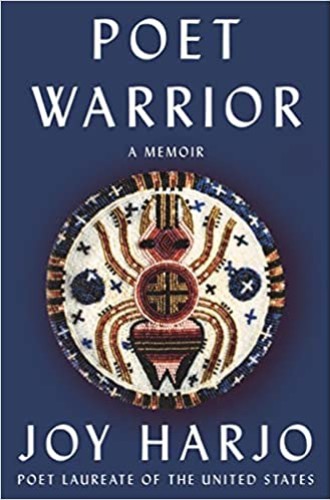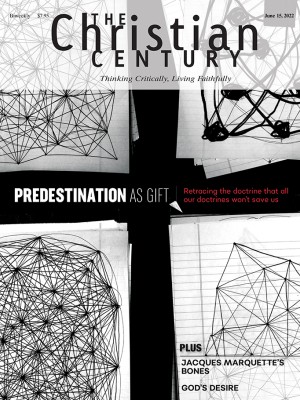Joy Harjo gives words to the poet warriors who were her ancestors
The Indigenous writer’s new memoir understands memory as counsel and ritual as the potency of love.
Joy Harjo, poet laureate of the United States since 2019, is clear about terminology in her memoir. She explains that members of Native nations like hers usually define themselves with reference to ancestral clans or homelands. Collectively they use the term Indian or American Indian. She prefers Indigenous, Native Nations, or Native—and chooses not to use Native American, a term she claims was coined in academic literature in the 1980s.
Why does terminology matter so much? Called by her ancestors to fight for the restoration of her people’s language and way of life, the author “reached for a gun. / She was given a paintbrush, / A saxophone, a pen. / These will be your instruments of power.” Harjo is finely aware of the living, breathing voices of her ancestors, and she seems skeptical of the written word, her own warrior weapon, because “too many with pens poised over paper wrote down laws that robbed millions of acres of our lands, that stole children, homes, and legacies.” One of her poems explains that “early in her writing life, the warrior poet decided” that if her “creative work did anything in this world, [she] wanted Indians to be seen as human beings.”
Read our latest issue or browse back issues.
A citizen of the Muscogee Nation and a resident of Tulsa, Oklahoma, Harjo belongs to ritual communities and wisdom councils that are not limited by space or time. In this book, poems separate sections of biographical prose, inviting readers to slow down and listen to the conversational wisdom of elders: “Life never goes in a straight line in our Native communities. Time moves slower.”
In one section, Harjo pays homage to an elder of the Eufaula-Canadian Tribal Town and the Wind Clan. She begins, “I do not remember when I first became aware [of him] . . . except that he was just there, and has been been looking after me since childhood. He helped me find the way as I have been lost many times.” She’s referring to her great-grandfather Henry Marsey Harjo. Born in 1862, he was a Baptist minister and a leader of the Seminole people in the years when Native territories and traditions were disappearing quickly under settlement patterns, agricultural practices, and social institutions imported from Europe.
Throughout the chapters of Poet Warrior, Harjo gathers wisdom from close conversations with trusted friends and family members, both living and dead. Her poem “Running” stumbles through a painful personal memory before it ends with the lines, “I was anything but history. / I was the wind.” Another poem reflects a lineage of poet warriors. It begins with the desperation of corporate suffering but moves quickly to the saving spirit of stories and intergenerational ritual: “Someone has to make it out alive, sang a grandfather / to his grandson, his granddaughter, / as he blew his most powerful song into the hearts of the children.”
Harjo shares a childhood memory of representatives from an evangelical church in Tulsa appearing on the steps of her elementary school with invitations to vacation Bible school taped to pieces of candy. Her parents had stopped taking her to the Methodist Sunday school, so she accepted the invitation and attended on her own. She liked the scripture stories, the crafts, the songs, and the snacks, and she identified with the people who wrote Psalm 23. They were sheepherders like the Navajo people.
However, she could not accept the implied rule that some people were not welcome in the wisdom community of the church. Even more disturbing to her young mind and heart were the understated but clear threats of hell that passed over the children throughout the week of instruction. She wondered why the Creator of all that is would decree that only people of certain religious associations are worthy of eternal life. When she told her mother that those who did not come to the altar at the Baptist church would go to hell, her mother replied that she was a Methodist, she believed in God, and she did not need to go to church.
Harjo brought her bewilderment over these contradictory messages to the crook of a tree near her home. There, in the branches of that steady neighbor, she clarified her thoughts. The church was like one of her school’s social cliques, from which she was excluded on account of her parents’ divorce, her Indian ancestry, and the Indian neighborhood in which she lived. She concluded that if her mother would not be in heaven, she did not want to be in heaven either.
Woven throughout the book are threads of humility and hope. Harjo remembers a gathering of elders, mostly women, arriving at a spiritual consensus: “They all agreed that we are being brought to a place where we will once again remember how to speak with animals, plants, and life forms. We will once again know our humble place,” she writes. “Humans are not the only ones with a spirit . . . nor are we more important than everyone else.”
The final page of Harjo’s memoir gathers themes of memory as counsel and guidance, of ritual as the potency of love. In the book’s final poem, Poet Warrior holds a newborn in her arms, welcomes the child to years on earth, and blesses her with “a song that would give her strength, / And sustenance, would always call her ancestors to stand behind her.”







